- Home
- Jeanne DuPrau
Car Trouble Page 7
Car Trouble Read online
Page 7
Duff was tired but wired at the same time. It was interesting to be in a place he’d never seen before, even if it was, at least this part of it, a kind of uninteresting place. It looked pretty much like the outskirts of any other city, but because it was early morning and the sun was rising in a pinkish yellow haze and the air had a tingly smell that seemed a combination of gas fumes and freshly cut grass, everything had a feeling of shimmery newness.
They were all hungry. They concentrated on their eggs and hash browns and didn’t talk much. Duff gazed out the window at the four lanes of morning traffic surging toward the stop light, halting, waiting while cars streamed across, starting again, stopping again, and on and on. All those people going off to work, he thought. Probably most of them heading for those tall buildings he could see from here. He imagined a little office cubicle behind each tiny glittering window, and—by nine o’clock or so—a little person in each cubicle, answering phone messages, reading emails, settling in for a day of work. That would be him, pretty soon.
Stu commented now and then on a passing car: “Nice Jag.”
“Classic Mustang—I could go for one like that.”
“Hey, look, a weird old Studebaker!”
So Duff stared at the cars, too, though he couldn’t tell one kind from another, until something he saw written on the front end of a bus caught his attention. THIS BUS GETS 250 MILES PER ACRE, it said.
“What’s that mean?” he asked Stu, pointing at the bus. Stu squinted at it. “Miles per acre?” he said. “Mystery to me.”
The bus turned the corner and drove past the restaurant. On its side, it said, SOYBEAN POWERED! THIS BUS RUNS ON SOYBEAN BIODIESEL. A picture of huge tan-colored round things that must be soybeans decorated the bus’s whole lower half.
“Biodiesel,” Duff said. “Do you know what that is?”
“Not really,” said Stu, forking in his last bite of fried potatoes. “Diesel I know, but not biodiesel.”
The bus stopped, sucked up the people waiting at the bus stop, and moved on. It seemed to be an ordinary city bus. How could it be running on soybeans? But if a car could run on air…
By the time Duff and the others had finished breakfast, a few more people were waiting at the bus stop outside. Duff couldn’t resist asking one of them about the bean bus.
“Oh, yeah,” said the guy he asked, a young man wearing a white shirt and tie and carrying his suit jacket under his arm. “We’ve got a fleet of them. They run on biodiesel. That’s fuel made out of vegetable oil, you know?”
“It’s not gas?” asked Duff.
“No, no. Like from beans or corn. The kind of oil you use to make french fries. You can make it out of used french fry oil, even.”
Stu yelled from the parking lot. “Duffer! Hurry up!”
“Wait just a sec!” Duff called back. “Really?” he said to the guy. “Used french fry oil?”
Another bus pulled up to the stop and the passengers started to get on. The guy in the suit nodded and moved forward. Duff moved with him.
“But why?” he said.
The guy shrugged. “For diesel engines, it works just as well,” he said. “And it doesn’t pollute.” He stepped up onto the bus and looked back at Duff. “Lots of cities have them,” he said, “but we were one of the first.”
The door slapped closed, and the bus pulled away, leaving Duff’s mind humming again, as it had when he’d come across the air car. He thought about the thousands of fast-food places dotted across the nation. Maybe every single McDonald’s and Burger King and Wendy’s could turn their used oil into biodiesel, and they could all have little fuel stations out back, and then people with diesel cars, when they’d finished eating their hamburgers, could—
“DUFF!” It was Bonnie’s voice this time. She and Stu were standing at the open doors of the car in the restaurant parking lot. “Get over here!”
Duff went. It was his turn to drive. But full stomachs made all of them sleepy. They’d spent the night more awake than not, and they needed to rest. So Duff drove until he found a good spot to park on a shady, out-of-the-way street. Bonnie took Moony for a short walk and then stretched out on the backseat of the car. Stu reclined the passenger seat as far as it would go and dozed off with his mouth open. Duff bunched up his jacket and leaned his head against the window, but he didn’t have room to stretch his legs out, and his mind was still churning with the notion of cars running on french fry oil, so he didn’t sleep much. By noon they were on the highway again, bound for Amarillo, Texas, where somehow they’d have to figure out a way to spend the night.
Phone Call #3
Friday, June 28, 11:35 AM
Wanda: Hello?
Rosalie Hopgood: Wanda, it’s Rosalie. I’ve been trying to call Bonnie. No answer. Do you know where she is?
Wanda: I do indeed. She drove off in your car last night with two boys.
Rosalie: Two boys? What boys?
Wanda: Sloppy-looking boys. One of them had long hair.
Rosalie: But what boys? Where did they come from?
Wanda: Don’t shout, Rosalie. I don’t know where they came from. They appeared, in your car, yesterday.
Rosalie: They appeared in my car! And now they’ve gone?
Wanda: Yes, gone to her aunt, Bonnie said. Aunt Shirley.
Rosalie: She told me that. But she said she was going to take the bus, leaving tomorrow. What’s she up to now?
Wanda: Listen, Rosalie, I really think that girl should—
Rosalie: Thank you, Wanda. Good-bye.
Phone Call #4
Friday, June 28, 11:38 AM
Burl (a close colleague of Rosalie Hopgood’s): Hello?
Rosalie: Burl, I have a problem. Bonnie’s taken off in the Chevy with two boys.
Burl: Oh, hi, Rosalie. Heard you got—
Rosalie: Did you hear what I said? That Chevy is out on the highway somewhere instead of safe in the driveway of my house.
Burl: Uh-huh.
Rosalie: And in the Chevy is a very significant bundle of cash.
Burl: Oh, from your last—
Rosalie: That’s right. I want you and Rolf to go after it.
Burl: After the Chevy?
Rosalie: And Bonnie. She’s with two boys! I want to know why.
Burl: But how do we find her?
Rosalie: She’s heading for Shirley’s, in Albuquerque. Four seventy-eight Cactus Wren Way. They left yesterday. Get going.
Burl: Now? But I was just—
Rosalie: Now. Ten percent of what’s in the trunk if you bring the Chevy back safe. And Bonnie, too, of course.
Burl: Okay, okay, we’re gone.
Chapter 10
A STU PROBLEM
All the way to Amarillo. Stu and Bonnie had a great time. Stu, who sat in the front seat, flicked on the radio as soon as they were out on the road. He found some music and turned it up loud, and he and Bonnie shouted along with it and bounced around in their seats. Duff didn’t bounce. He didn’t shout. He wished he were the sort of person who liked to bounce and shout, but he knew he couldn’t pretend to be; it would look all wrong. Instead, between songs, he told them about how fast-food places could turn into gas stations, and he described a couple more of the computer games he’d created, the ones called Zoomball and Angry Alien Anteaters. Stu and Bonnie listened politely, and Bonnie said, “Amazing!” about the french fry fuel. Then they went back to their music.
After a while, Stu turned down the radio, crooked his elbow over the back of the seat, and twisted around to talk to Bonnie.
“Listen,” he said, “I have a buddy in LA who’s in the music business. Maybe he could help you some way.”
“You think so? That would be great.”
“Sure, he’s in with lots of the groups. And the big companies, too, I think. We could meet up there, maybe, later on, and I could introduce you.”
“Fantastic,” said Bonnie.
“Also,” Stu went on, “this friend of mine has connections to recording stud
ios. You could make a demo, you know? And I could give it to him, and he could play it for the right people.”
“Really?”
“Yeah.”
“Cool. It’s so good I met you, Stu.”
“Hey, what about me?” said Duff. He meant to say it in a jolly, teasing way, but it came out as a wounded croak.
“Sure. You, too,” Bonnie said. “Of course.”
“This buddy of mine,” said Stu, “the last time I talked to him, he was telling me about a guy who sent in a demo—no one had ever heard of him—and they liked it so much they offered him a contract before they even met him.”
“You’re kidding me,” Bonnie said.
“No, really.”
“That is so cool.”
They went on like this. Duff was left out, which seemed unfair, since without him Stu would still be standing by the road with his thumb out. He wasn’t obliged to take Stu anywhere. He could have left Stu in St. Louis to fend for himself. Probably should have, he thought sourly. Then he and Bonnie would be making this trip on their own. Would that be a bad thing or a good thing? Bad: talking to girls made him nervous. Good: he found Bonnie sort of interesting, even though (or because?) she was a criminal’s daughter. He felt sorry for her, too. The image of her crying into Moony’s neck fur stayed in his mind.
By four o’clock, they were rolling into Amarillo. Duff, who had driven the whole way, was seriously tired. Stu, who’d been having a great time, was full of energy. “Okay,” he said. “How about we have a picnic? We get some sandwiches, we find a park, we eat. Then, with rested minds and satisfied stomachs, we figure out what to do next.”
No one had a better plan, so that’s what they did. They found a deli and bought food, and they found a park with a nice big lawn, crowded with picnickers and Frisbee players. It was all very festive, but Duff was too tired to enjoy it. After they’d eaten, he stretched out on the grass with his head on his duffel bag and closed his eyes. Let Stu and Bonnie figure out the next step of the journey. For the moment, he was checking out.
*
“Hey, wake up.”
Duff’s eyes sprang open, and he saw Bonnie standing over him, nudging him with her toe. He sat up. “What’s the matter?”
“Stu’s gone,” said Bonnie.
“Gone?” Duff felt a sudden lightness. He tried to keep himself from smiling.
“Yeah,” Bonnie said. “It was weird. We were just sitting here, and all of a sudden he jumped up with this kind of scared look on his face and said, ‘I gotta go.’ So I said, ‘Go where?’ and he said he had to go get some cigarettes, he was all out. But I’ve never seen him smoke even once, have you?”
“Nope, not once.”
“He said he’d be right back, and that was”—she looked at her watch—“that was over an hour ago.”
“Maybe he just took off.”
“But why would he do that? He likes me—us, I mean. He wants to travel with us.”
Duff thought about this. Here was his chance to part ways with Stu. It would be easy. And no big tragedy for Stu—he had hitchhiked before he met Duff, he could hitchhike again. It would be justifiable, too. Why should they wait around for him if he was going to just disappear like this?
“Maybe something’s happened to him,” Bonnie said.
“Like what?”
“I don’t know. Like he got hit by a car. Or he got lost. Or he got accidentally locked in the men’s room or something.”
Duff longed to leap to his feet, jump in the car with Bonnie, and be gone, leaving Stu to find his way alone. But he could think of three reasons not to. Reason one was Bonnie. Obviously, for some mysterious reason, she liked Stu and didn’t want to abandon him. Reason two was that it was because of Bonnie that Duff wasn’t still in St. Louis without a car. She had done him a favor, and he should do her one in return. Reason three was plain old human kindness. There was at least a remote possibility that Stu was in trouble and needed help. Yes, he was an annoying human being, and probably a dishonest one, but still he was one. And Duff had to admit that in spite of everything, he did like Stu a tiny bit. He was a cheerful guy, whatever else he might be.
“I guess we better wait till we find him,” he said. “I guess we can’t just leave him.”
So they waited, sitting there in the park in the shade of a large tree. It would have been a good time to talk, if only Duff’s shyness hadn’t grabbed hold of him again. But now that Stu wasn’t there chattering away, he couldn’t think of what to talk about. He’d never mentioned having seen Bonnie crying in the backyard. She hadn’t mentioned it, either. Was she sad about her mother? He thought about how he’d feel if his own mother were put in jail—arrested, say, for pouring hot coffee over some obnoxious patron at the restaurant, though that would be an extremely unlikely thing for his mild-mannered mother to do. But if it had happened, he’d feel all kinds of ways: mad at his mother for doing such a dumb thing, mad at the obnoxious customer, sad that his mother had to sit in some crummy jail, sorry for himself for being suddenly motherless…. Maybe Bonnie felt all that, too. How could he ask her about it?
She was sitting cross-legged, bending over and pulling up grass blades. She pulled them slowly so they came out whole, and then she chewed a little on the whitish root part. She was close enough to Duff that he could smell something sort of sweet and toasty—maybe the suntan lotion she put on her legs. His mind raced, searching for words.
Finally he said, “Your mom, and everything…that must be…I mean, you must feel—”
But as soon as he spoke, Bonnie frowned at the ground and scrambled to her feet. “Don’t talk to me about it,” she said. “You don’t know anything.”
She stooped down to open the door of Moony’s carrying case. He bounded out as if shot from a cannon, ran a few hundred feet in a straight line, and then ran back and leaped around Bonnie’s feet. From inside the case, she fetched an ancient Day-Glo green tennis ball and threw it with a powerful overhand pitch. Moony raced after it.
Duff felt as if he’d had cold water splashed in his face. As usual, he’d said the wrong thing. Why hadn’t he kept his mouth shut? He couldn’t do human relations, he might as well just accept it. For a moment, he had a powerful wish to be back in his bedroom at home, with all his systems humming and the door securely shut—back where any problem could be solved with a few lines of good code.
He got out his laptop. Its battery was still pretty well charged up. And maybe since he was in an actual city he could even get online. He gave it a try. Yes! He was on. There must be a node nearby.
He checked his e-mail. He had two messages. One was this:
Dear M. Pringle,
We appreciate your interest in our revolutionary vehicle powered by air. Many of very brilliant people are helping develop this car. It is a new adventure most exciting!
Thank you for writing to us, and good fortune on your journey.
The Team
Duff was thrilled with this message. He could tell by the oddities in the sentences that it was written by actual French people and came from actual France. The M. before Pringle must stand for Monsieur. He liked that—Monsieur Pringle. There was something friendly and exuberant about this note that made him happy.
The second message was this:
Dear Duff,
A minor problem has come up. Looks like expected funding may not materialize. But not to worry!! Worst case, we make the Vortex team a little smaller. Or cut it down to just YOU!!! Know you could handle it!!!!
Ping
Duff wasn’t sure what to make of this. Should he be worried or flattered? What exactly was involved in running an entire project? Would he have to do things like budgets and marketing? Would he have to do the work of four or five people?
Moony dashed up to him and dropped the tennis ball on his keyboard, where it rolled over the keys, leaving a path of dog spit. “He’s giving you a turn to throw the ball for him,” Bonnie said.
“Oh,” said Duff. “Okay.”
With his thumb and one finger, he picked up the slimy ball. He threw it as far as he could, and Moony bounded away.
“What are you doing?” Bonnie said. She seemed to have got over being mad.
“Getting my email,” Duff said. “This one’s from the company I’m going to work for.”
Bonnie leaned over and peered at the screen. One of her ponytails brushed Duff’s chin. She seemed distracted. She stood up. “Stu must have got kidnapped. It’s after seven o’clock.” Then, after a moment, she said, “Uh-oh,” and started walking away.
Duff looked up. Over by the picnic tables, he saw Moony, who had his paws up on a bench beside a fat guy in a backward baseball cap. A second later, Moony jumped up on the bench and snatched something from the table. The fat guy started yelling, and Bonnie ran toward him. She scooped up Moony, said something to the fat guy, and the fat guy, in a loud voice and with many hand gestures, said something to her. Then she turned around and came back to Duff.
“Moony ate his deviled egg,” she said. “Boy, was that guy mad. My fault. I have to keep an eye on this dog. He runs off.” She put Moony back in his carrying case and closed the door.
“Okay,” she said, and her tone of voice made Duff snap his eyes up from the screen. “We have to do something. Stu’s been gone an hour and a half. You stay here with our stuff, and I’m going to go look for him.”
She walked off before Duff could even answer. He watched her go. She marched across the lawn, her arms slicing back and forth, her hands curled almost into fists. Nobody better get in her way, Duff thought.
He shut down his laptop and zipped it into its case. He should have been the one to go out looking for Stu. He should have said, in a take-charge way, “Enough of this waiting around,” and ventured out into the streets of Amarillo. But oh, no. He was glued to the computer screen, as usual. He plunked down onto his duffel bag, put his elbows on his knees and his chin in his hands, and gazed at Bonnie’s retreating back, now just a white spot at the edge of a street at the far end of the park. She was waiting for a red light to change. When it did, she sprang forward, running. Why running all of a sudden? Duff stood up and shaded his eyes with his hand. The white spot that was Bonnie ran toward a red spot on the other side of the street. Both spots stood still for a moment facing each other, their arms moving, and then they came back in Duff’s direction.

 The Prophet of Yonwood
The Prophet of Yonwood The City of Ember
The City of Ember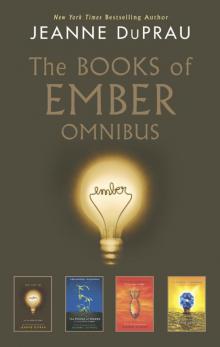 The Books of Ember Omnibus
The Books of Ember Omnibus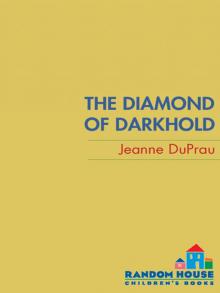 The Diamond of Darkhold
The Diamond of Darkhold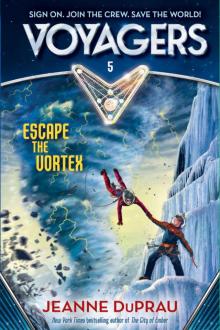 Voyagers: Escape the Vortex (Book 5)
Voyagers: Escape the Vortex (Book 5) The City of Ember Deluxe Edition
The City of Ember Deluxe Edition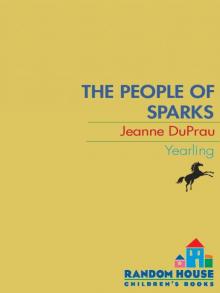 The People of Sparks: The Second Book of Ember (Books of Ember)
The People of Sparks: The Second Book of Ember (Books of Ember)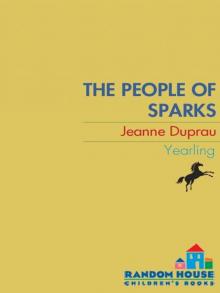 The People of Sparks
The People of Sparks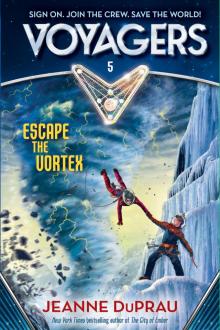 Escape the Vortex
Escape the Vortex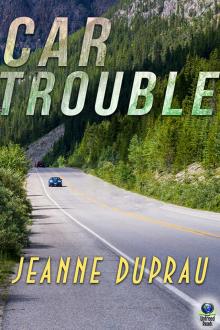 Car Trouble
Car Trouble The City of Ember: The First Book of Ember
The City of Ember: The First Book of Ember